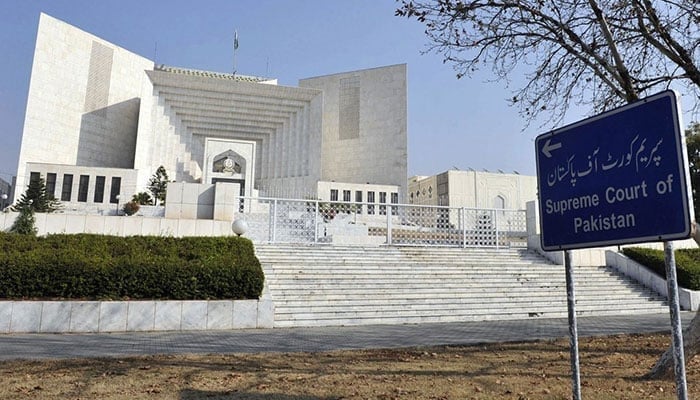The constitutional bench of the Supreme Court recently heard several important cases, including matters related to the private use of the Islamabad Convention Centre, the recovery of embezzled funds, contempt of court, and the establishment of an IT university in Islamabad.
### **Private Use of Islamabad Convention Centre**
The court addressed a case concerning the private use of the Islamabad Convention Centre. During proceedings, the bench sought a response from the Attorney General’s office. Justice Mazhar noted that a notice had been issued to a former prime minister as part of this suo motu case. Justice Mandokhail directed that the convention centre should be managed in accordance with the institution’s established policies.
The additional attorney general requested more time to gather details about outstanding dues, to which Justice Aminuddin responded, “Obtain the information and update the court.” The hearing was then adjourned.
### **Recovery of Embezzled Funds**
The court also took up a case concerning undisclosed foreign bank accounts and the recovery of embezzled funds. Advocate Hafiz Ahsan argued that amendments had been made to the income tax law, and that legal proceedings related to undisclosed accounts and fund recovery were ongoing. Justice Mazhar pointed out that orders had been issued for reports from all relevant agencies, including the FIA and the Federal Board of Revenue (FBR).
The FBR’s counsel stated that the matter mainly concerned the FBR and FIA, with no involvement from other agencies. Justice Mazhar emphasized that if any attempt were made to close the case, a report should be submitted. The court directed the FIA and FBR to submit a detailed report regarding the undisclosed foreign accounts and the recovery of embezzled funds. The hearing was adjourned for two weeks.
### **Contempt of Court Case Against Former Ombudsperson**
The court granted additional time for the counsel representing the Federal Ombudsperson to submit a response in a contempt of court case. Justice Aminuddin noted that former federal ombudsperson Yasmin Abbasi had failed to appear before the court, despite attending previous hearings. Justice Mazhar mentioned that Abbasi had continued a case despite a stay order from the Lahore High Court, which amounted to contempt of court.
Justice Mandokhail questioned why the court should continue with the case against a former official, while Justice Hilali raised the issue of whether the actions of the ombudsperson could be challenged in the high court. Justice Aminuddin clarified that the high court had jurisdiction if any forum exceeded its authority.
Justice Mazhar further pointed out that the ombudsperson had issued arrest warrants for a judge in connection with this case, escalating tensions. The court directed that a notice be issued to the current Federal Ombudsperson to clarify whether they wished to proceed with or withdraw the case. The matter was adjourned for further proceedings.
### **Suo Motu Case on Anti-Terrorism**
In a suo motu case concerning anti-terrorism laws, lawyer Munir Paracha argued that further proceedings were unnecessary due to the 26th Constitutional Amendment, which he claimed had removed the Supreme Court’s authority to take suo motu notice. However, Justice Mazhar clarified that while the procedure had changed, the Supreme Court still retained the power to take suo motu notice, but such cases would now be handled by a constitutional bench. The court disposed of the case, with the understanding that the issue would be addressed in a future case when it arises.
### **IT University Issue**
The court heard a case about the establishment of an IT university in Islamabad. CDA lawyer Munir Paracha argued that land for educational purposes could not be allotted without approval from the federal cabinet. He stated that land in Sector I-17 could be made available once necessary approvals were obtained. Justice Hilali expressed concerns about the potential hidden motives behind the land’s allocation, suggesting that someone might be eyeing the land for other purposes.
Justice Mandokhail proposed referring the matter to the Special Investment Facilitation Council (SIFC), while Justice Hilali emphasized the importance of establishing the university to benefit the public. The petitioner’s lawyer, Salman Butt, argued that foreign investors were being misled into investing only to be later sidelined. The court instructed all parties to work towards an amicable resolution and adjourned the hearing for 10 days.
### **Lady Health Workers Case**
The court also took up petitions filed by lady health workers against the Sindh government. The Advocate General of Sindh appeared via video link and stated that the regularisation of these workers had been carried out in compliance with previous court orders. He argued that this case did not fall under Section 146(3). Justice Mazhar questioned why the regularisation of health workers was not a matter of fundamental rights and asked the Advocate General to clarify the structure established by the Sindh government for these workers.
The court noted that the petitioner had acknowledged the implementation of the court’s orders. However, as the petitioner’s lawyer and Advocate on Record were absent, the court decided to issue notices and hear the case together with similar matters. The hearing was adjourned indefinitely.
### **Judicial Employees’ Appeal Rights**
In a case concerning the appeal rights of judicial employees, Justice Mandokhail remarked that it was the responsibility of the relevant high courts to formulate rules for judicial employees’ appeals. He further stated that a petition under Article 199, Sub-section 5, was not applicable in this context. The court issued notices to all parties involved and adjourned the hearing for further proceedings.
These proceedings reflect the ongoing efforts by the Supreme Court to address issues of public importance, including the management of state assets, the accountability of public officials, and the protection of workers’ rights. The court’s decisions are aimed at ensuring the rule of law and holding institutions accountable.



